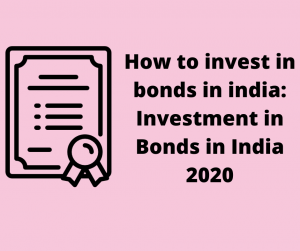
Investment Bonds are the debt instruments in which the authorized issuer owes the bondholders a debt. It depends on the terms of bonds’ type, the issuer of the bonds is obliged to pay interest and/or they have to repay the principal at a later date upon maturity. In easier terms, a bond is a formal contract to repay borrowed money with an interest at fixed periods. Bonds are a way to raise money. When a person purchases any type of bond (government, convertible, callable, etc.), they are lending money to the issuer which can be a corporation, the government, a federal agency, or any other entity. In return, the issuer promises to the investor to pay a specified rate of interest during the life of the bond. The issuer also has to repay the face value of the bond when upon maturity of the term.
Why should you be investing in Bonds in 2020?
CAPITAL PRESERVATION
There is no risk to your capital as investment bonds are a less risky investment option.
STEADY INCOME
Returns on investment bonds are assured. But, they offer a lower Return on Investment when compared to Equity.
TAX ADVANTAGE
If you fall in the higher tax bracket, Tax-Free investment bonds are one of the best options.
Types of Bonds and How can you invest in Bonds?
Sovereign Gold Bonds
Such gold bonds are issued on behalf of the government by the Reserve Bank of India in multiples of 1gm. They pay a fixed interest of 2.5%. One can opt for the exit option available in the fifth year, though the tenor of the bond is for eight years. One can borrow money on collateral of these bonds. Such bonds are also listed in BSE and NSE where the investors can buy and sell the bonds on the stock exchange after the subscription period is over at the current market price. The bonds can be bought from Stock Exchanges, banks, Designated post offices, and other sources notified by the Government. Such bonds can be bought in cash up to ₹20.000 and online as well where one can discount up to ₹50 on the Issue Price.
Gold’s Exchange Traded Funds
ETFs offered by primarily Mutual funds trade in Physical gold where physical gold held in ETF Units equivalent to 1gm each by the custodian banks. As per SEBI guidelines they are valued periodically. There is a cost involved in managing ETFs. Investors who invest in ETF’s should open a Demat account and also have a trading account opened with Broker to buy or sell the ETF units after the new fund offer for the ETF closes., Just like any other mutual fund, Investors can buy units of the gold funds and these funds invest in the units of the gold ETFs to give investors similar exposure to gold.
Capital Gain Bonds
Capital Gains Bonds are those instruments in which there is the tax exemption for transferring gains of long term capital assets. The Investment in these Bonds is to be made within six months from the date of such transfer of capital assets (Land/House Property etc.) for being exempted from Capital Gains Tax under Section 54EC of the Income Tax Act, 1961.
Tax-Free Bonds

Tax-Free Bonds are those instruments in which the interest earned is not taxed. However, the principal invested in these bonds will remain the same.
These bonds can be listed on the Bombay and National Stock Exchange, so investors do have the option of selling the bond before the term expires. However, the price you may get for selling before the bonds expire heavily depends on market conditions. As per the experts, these bonds make sense only for very risk-averse investors with a lot of cash at hand (say upward of ₹ 100,000).
For more updated information related to Investment-related solutions. listen to the podcasts- ‘Paisa Vaisa’ Paisa Vaisa (Hindi) in Hindi | हिन्दी मे | KUKUFM, Money with Monika, Why not Mint Money. The panacea for all the investment problems.



0 Comments